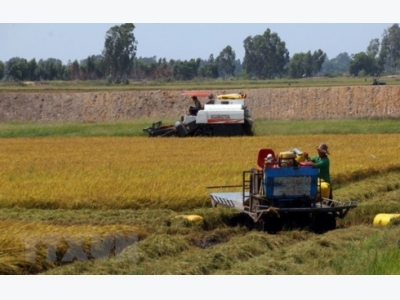Mekong Delta seeks to turn agriculture challenges into opportunities

A workshop on new techniques under the Consortium for Unfavourable Rice Environments (CURE) was held in Can Tho city on January 30, highlighting the need to turn challenges into opportunities for Mekong Delta agriculture.
Prof. Bradford Mills from the US’s University of Virginia said saltwater and flood prevention, a traditional agricultural practice in the Mekong Delta, no longer matches modern agricultural development. Studies show that using farming plant varieties and animal breeds that suit local soil conditions will help turn challenges into opportunities.
Agreeing, CURE expert Jeffrey Alwang said the Mekong Delta needs to plan agricultural activities according to agro-ecological zones, elaborating that in upper river areas, agricultural production should be switched to eight crops per three years, including rice-aquatic farming, rice-lotus farming and luc binh (water hyacinth) farming.
Instead of preventing saline intrusion in the river mouth and coastal areas, farmers should consider saltwater as a natural resource and adopt crops other than rice such as rice-shrimp farming and farming of saltwater aquatic species. Meanwhile, integrated agriculture-forestry like cajuput-aquaculture and cajuput-rice-aquaculture should be promoted in the Ca Mau Peninsula, which has submerged forests.
Nguyen Thi Lang, Director of the Mekong Delta Institute for High Technology Agriculture Research, suggested solutions to improve Vietnamese rice quality, aiming to export rice to demanding markets instead of shipping up to one-third of total rice exports to China like at present.
She said scientists need to advise the Government about communication strategies and training to raise farmers’ adaptability to high-tech agriculture. It is also important to develop rice varieties tolerant of harsh natural conditions and climate change.
Lang added her institute is transferring saltwater, flood and drought tolerant varieties which have been successfully piloted in many provinces.
Related news
 Vietnam’s taste for beef soars, but cattle industry can't find its feet
Vietnam’s taste for beef soars, but cattle industry can't find its feet By developing each stage of the production chain, from feed production, to breeding and slaughtering, Vietnam could cut its reliance on imported beef
 Vietnam, Belgium examine ways to boost agriculture
Vietnam, Belgium examine ways to boost agriculture Belgium and Vietnam have a long tradition of cooperation in the sector and Belgian funding has helped Vietnam develop its dairy and aquaculture sector.
 Hau Giang: Over 15,000 farmers join agriculture transformation project
Hau Giang: Over 15,000 farmers join agriculture transformation project More than 15,000 farmers in the Mekong Delta province of Hau Giang will benefit from the Vietnam Sustainable Agriculture Transformation project